Based upon the theme of ‘Building the Nation, Responsibly’, the Society of Indian Automobile Manufacturers (SIAM) held its 56th Annual Convention in New Delhi on August 31 with Mr. Anant G. Geete, Minister of Heavy Industries and Public Enterprises, as the Chief Guest.
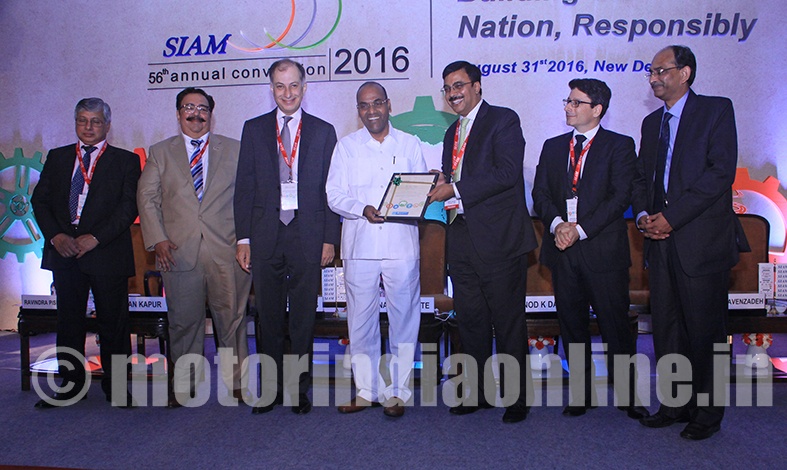
Addressing the gathering, Mr. Anant Geete said: “After the Prime Minister gave the ‘Make in India’ call, the auto industry has played a key role in this programme. The environment is one of the biggest concerns for the sector. We have therefore allocated Rs. 14,000 crores for the FAME scheme for promoting hybrid and electric mobility, which will save Rs. 60,000 crores fuel, thereby benefitting the environment.”
Reiterating the Government’s support to the industry, he added: “India is looked upon as the world’s youngest nation because we have the most people below 35 years. We should use this youth power by giving them jobs. And the auto industry has the biggest scope for providing these jobs. If jobs fall in agriculture, only industry can make good this shortfall.”
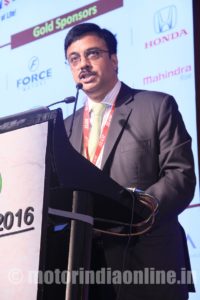
Earlier, In his welcome address, Mr. Vinod K. Dasari, President, SIAM, said: “We appreciate the support from the Minister and the Ministry of Heavy Industries. We also welcome the Government’s efforts in passing GST but request that there be no more than two rates for the automotive industry. The Indian automotive industry is facing new challenges in providing sustainable mobility for the masses. We have sought a long-term roadmap on safety, emissions and fuel efficiency norms. In order to make practical and rational regulations, we seek a single ministry, single window for the industry. We would also like to thank the Government for accepting the SIAM suggestion of the fleet modernisation scheme. The industry will be happy to offer further incentives to customers to supplement the Government’s incentive for purchase of a new vehicle against a scrapped vehicle.”
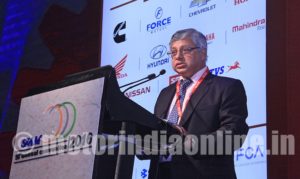
Mr. John Moavenzadeh, Head of Mobility Industries, World Economic Forum on Global Trends in Mobility, USA, said: “We are witnessing the 4th Industrial Revolution and the shifting Automotive Game. The 4th Industrial Revolution is not categorised by one single technology but by diverse technologies. The global auto industry is in the midst of a more profound transformation not seen in the past 100 years. Automotive demand is undergoing a seismic shift between developed and emerging economies. The automotive game is changing from volume to value; from the customer’s focus on the product to the mobility experience; from customer-driven vehicles to software-driven ones. By 2026, the Indian automotive industry will be among the top three in the world in engineering, manufacture and exports of vehicles and components.”
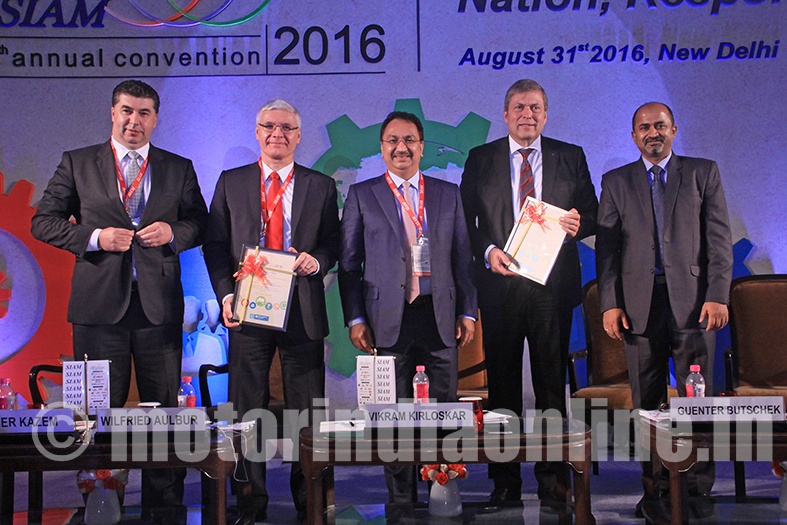
Speaking on the theme ‘Sustainable Mobility for Creation of Wealth of Nations’, Mr. Guenter Butschek, Chief Executive Officer and Managing Director, Tata Motors, said: “As a home ground to the world’s largest youth population, the Indian economy is witnessing an unprecedented advantage compared to other countries. The Indian automobile industry contributes to approximately 40% of the nation’s manufacturing GDP and is surrounded by a cloud of opportunities fostering new generation R&D and innovation. Taking into account challenges such as safety, pollution, unemployment and lack of adequate resources, it is imperative for the leading automobile manufacturers to focus on developing ‘sustainable mobility solutions’, in addition to nurturing skilled engineers and people managers rather technocrats and theory masters.”
In the same vein, he added: “The good news is that new horizons like safety norms, GST and the scrappage policy are unfolding and would give the opportunity to counter these challenges. The focus should be on building a strong partnership between the industry and the Government to ensure we work together towards a long-term regulatory regime for the industry and need to identify technologies based on global mega trends and regulations”.
He concluded with his expert comment: “It is for the Indian automobile industry to decide whether they want to be followers or leaders and put India on the global automotive map.”
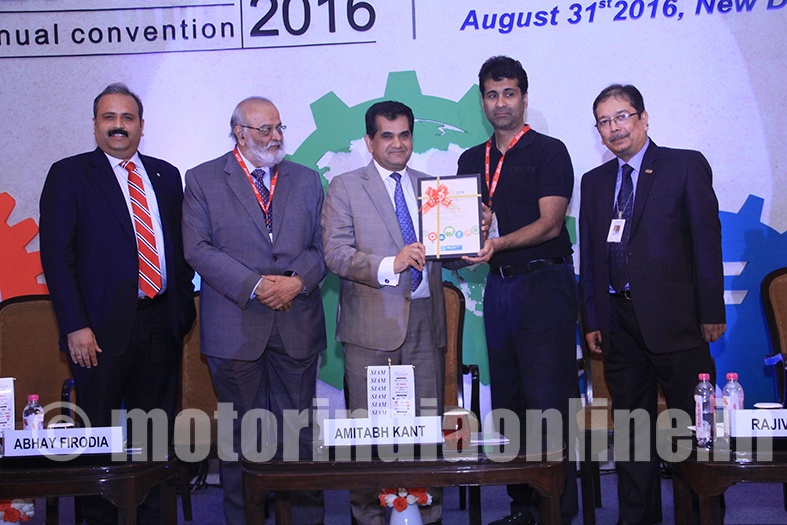
Dr. Wilfried Aulbur, Managing Partner India, Chairman Middle East & Africa, Head Automotive Asia, Roland Berger India, said: “The automotive industry is a significant driver for FDI in India. It also drives process improvements and quality. However, these opportunities are not fully used. We need to stimulate volumes to boost GDP and create more job opportunities. While the Government’s support is appreciated, a holistic, long-term policy is required. We believe GST will contribute in the growth of India’s automobile sector.”
At the second session on ‘Technology Trends’, Mr. Nitin Gadkari, Minister of Road Transport, Highways and Shipping, who was the Chief Guest on the occasion, welcomed the industry’s support for solving the pollution problem and agreeing to move straight to BS-VI from BS-IV, and sought its support for improving the overall road safety.
The Minister observed: “The automotive sector is on the road towards growth and success with a turnover of Rs. 4,50,000 crores that is generating many jobs. The Government is seeking ways to ensure that a large part of the global supply can be exported from India. While pollution is one of the biggest concerns, the industry has been very supportive of our efforts to address this issue. We are attempting to implement a scrapping policy for old vehicles, which will help reduce pollution.”
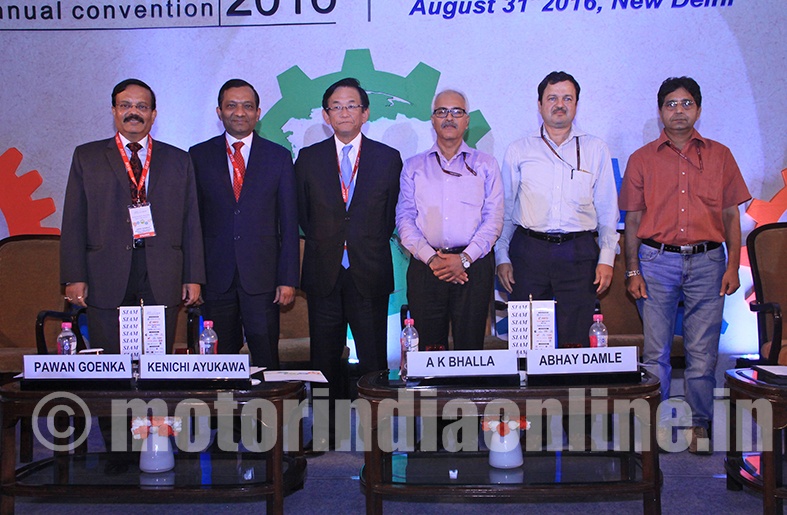
He added: “The promise of GST will be fulfilled. Five lakh accidents occur annually leading to 2.5 lakh deaths. We need the industry’s support to address the issue of accident spots across the country. In 10 years, we believe India’s automotive sector will be the No.1 in the world and the industry’s support is required to realise this goal.”
Speaking at the conclave, Mr. Ariel Sella, Managing Director, Capsula – Smart Mobility, Tel Aviv University, said: “In 1908 there was huge disruption caused by gasoline, with mobility moving from horse carriages to cars. Now in 2016, Smart Mobility is triggering disruptions. Smart Mobility is about applying data and sensing communications in vehicles.”
Addressing the gathering, Dr. Robert Stephen Moran, Deputy Head, Office for Low Emission Vehicles, Departments for Transport, Business, Energy & Industrial Strategy of the UK, said: “As we move towards more efficient models, diesel engines have a big role to play in the UK. Here, there are four policy drivers: air quality, energy security, carbon and inward investments. The Government will spend more than £600 million between 2015 and 2021 to support uptake and manufacturing of ultra low emission vehicles and keep the UK on track for all new cars to be effectively zero emission by 2040. But some challenges remain: creating a self-sustaining market not reliant on Government support and improving the UK consumers’ offer on charging stations.”